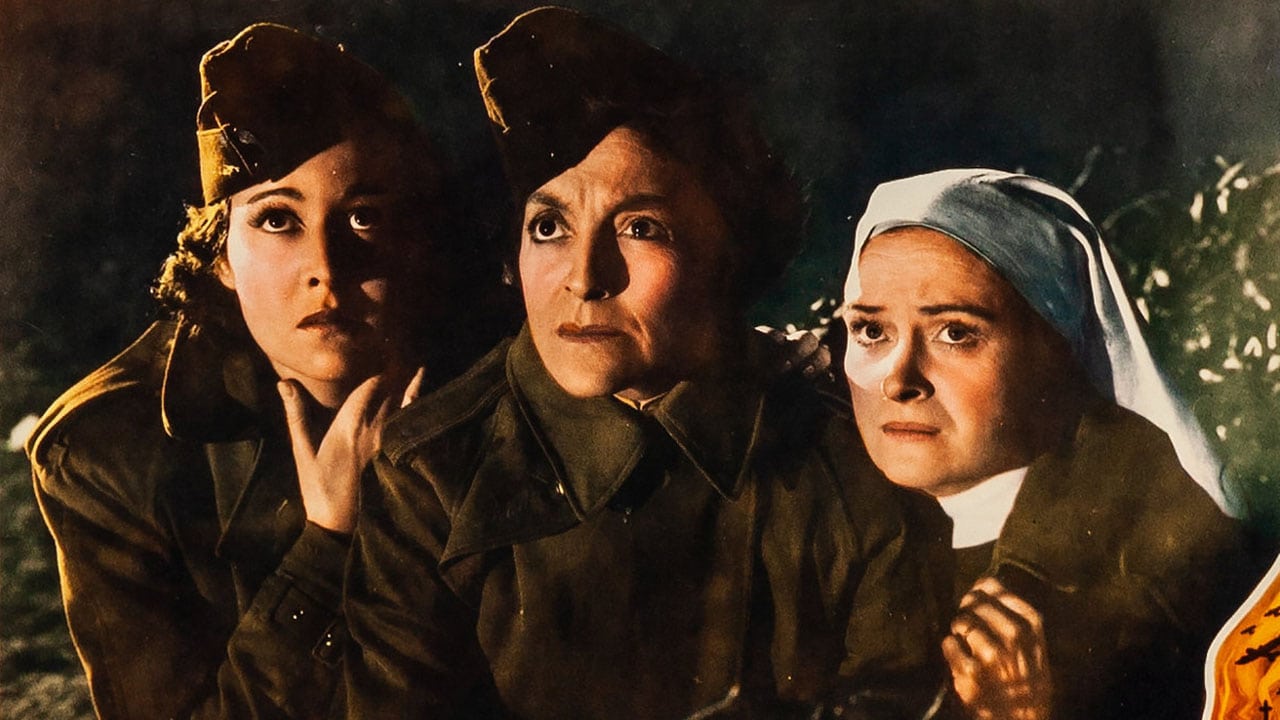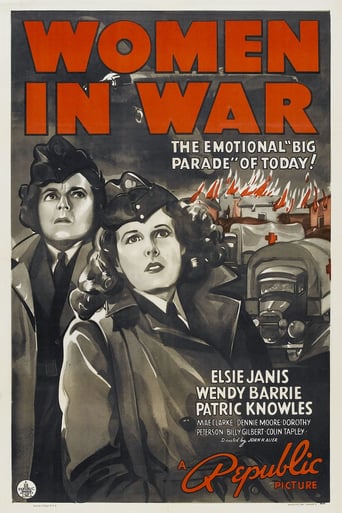GetPapa
Far from Perfect, Far from Terrible
KnotStronger
This is a must-see and one of the best documentaries - and films - of this year.
Lollivan
It's the kind of movie you'll want to see a second time with someone who hasn't seen it yet, to remember what it was like to watch it for the first time.
Micah Lloyd
Excellent characters with emotional depth. My wife, daughter and granddaughter all enjoyed it...and me, too! Very good movie! You won't be disappointed.
kevin olzak
1940's "Women in War" is a long unseen Republic programmer that earned an Academy Award nomination for its special effects, surprisingly effective for a Poverty Row studio. Acclaimed stage actress Elsie Janis, veteran of only six silent features (none in 21 years), made her final screen appearance (and only talkie) as Miss O'Neill, long estranged mother of troubled daughter Pamela Starr (Wendy Barrie), on trial for murder after the accidental death of a British officer who had tried to molest her. Now enlisted in the Overseas Nursing Corps (thanks to her mother's efforts), Pamela finds herself falling for Lt. Larry Hall (Patric Knowles), persistent in his attentions even after she reveals her 'sordid past.' Larry is unhappily engaged to fellow nurse Gail Halliday (Mae Clarke), no different from the other nurses in that they all show disdain for Pamela's reputation. Through it all, Miss O'Neill steadfastly refuses to divulge her true identity to her daughter, who assumes that the matron dislikes her just like all the others. Special effects action take a back seat to the soap opera, a disappointment for many critics. Billy Gilbert stands out as a French cobbler relating the tale of how he met his wife in a dark cellar, while numerous veterans of Universal Horror are prominent- Patric Knowles ("Frankenstein Meets the Wolf Man"), Lawrence Grant ("Son of Frankenstein"), Holmes Herbert ("The Ghost of Frankenstein"), Lester Matthews ("WereWolf of London"), and of course, Mae Clarke, Elizabeth in the 1931 "Frankenstein." Speaking of Frankenstein, this was the fourth of Peter Cushing's Hollywood Seven, the first in which he was unbilled, and the only one he made at Republic (bearing a strong resemblance to his earlier RKO "Vigil in the Night," also dealing with nurses and their soap opera lives). Getting less than two minutes on screen, he is introduced at the 13 minute mark as Larry Hall's fellow flier Captain Evans, smoking, drinking and flirting, making his exit at the 20 minute mark. Like "Laddie" or "They Dare Not Love," this too was long thought lost, but can be found by the dedicated buff.
Bob Verini
The film isn't lost or unavailable; I own a VHS copy. Very timely in its day, it begins with the British defeat of the Graf Spee at the River Plate in Dec. 1939, mere months before its 1940 release. The titular women are a group of nurses sent to the front in France pre-Dunkirk. Prominent among them is Pamela (Wendy Barrie), a feckless party girl who beats a manslaughter rap by enlisting in the Women's Auxiliary. (Don't ask.) Serving under the command of a tart but kindly major (legendary theatre veteran Elsie Janis, very watchable and believable) who is in reality--gasp!--the mother Pamela has never met, the pert miss learns leadership and character by the end, of course, and gets the guy as well. Every bit as stiff-upper-lip as Mrs. Miniver but with duller characters, the movie is notable for its exceptional Oscar-nominated visual effects, principally in the 20-minute assault on a French village by British artillery unaware that trapped in the village are, you guessed it, the women in war.
arneblaze
This is a good little film, derived from the story idea of CAPTAINS COURAGEOUS. Wendy Barrie stars as an American woman of loose morals, whose parents divorced shortly after her birth. She has been raised by her libertine father and has never seen her mother. When she repels an unwanted advance of an evening, it ends in the accidental death of the masher. She is unrepentant and the jury is only swung to her favor by the fabricated story that she has enlisted in the nursing corps. She of course has to make good on this and winds up in England. The matron is her mother, played by Elsie Janis. Mom knows since she finagled the whole thing to save her daughter from prison, but daughter doesn't know mom is matron.Because of her past, she does not fit in with the other nurses and tries to get even by stealing one's fiance, but inadvertently falls for the lug (Patric Knowles). Mom tries to instill discipline and affection in her daughter's life. In the climactic final scenes the jilted woman deliberately drives both of them into no man's land. Of course mom and the nurses have to rescue them. The special effects (the burning village, bombs and guns exploding everywhere, and the rather obvious use of miniatures in an aerial attack on a ship) earned an Oscar nom and for Republic's stature, I must say they were effective and well done for the period.Former vaudeville star, Elsie Janis, shines in a serious dramatic role as mom and Wendy Barrie is quite fine as the disillusioned, chip on her shoulder lead. Mae Clarke (WATERLOO BRIDGE, FRANKENSTEIN) is on hand as the jilted woman.All in all, a good little war film from Republic.

